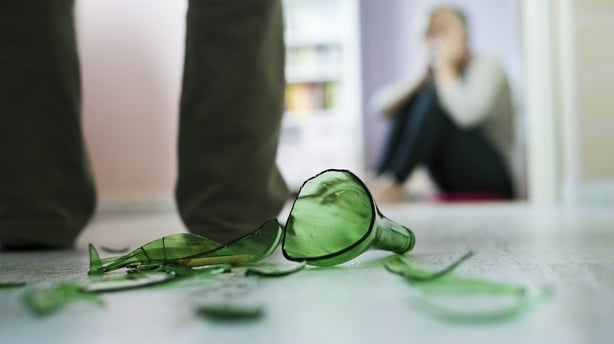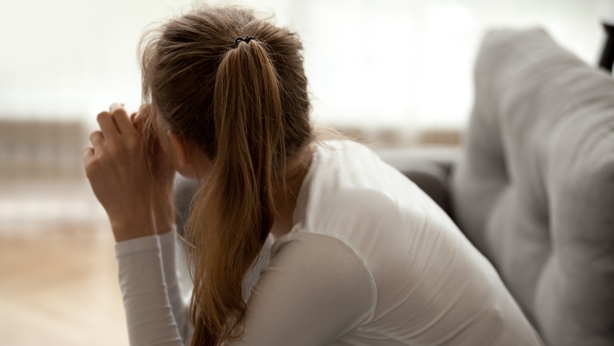It's a storyline that has gripped hundreds of thousands of viewers, and as Chantal's fate came to pass in last week's episode of Eastenders many were left unsettled and disturbed by the reality of domestic violence the soap portrayed.
Sarah Benson, CEO of Women's Aid, spoke to the Jennifer Zamparelli show on 2FM yesterday morning about the storyline and how recent months have seen a sharp increase in calls to the organisation's helpline.
She began by saying that while she hadn't checked in with her team yet, she was expecting many responses to the harrowing episode.
"Throughout the year, we have had callers who have had their own emotional response to seeing that abusive relationship even before the depiction of the murder on Friday", she said. "So I have no doubt that all through the weekend there would have been some responses."
Domestic abuse can be fatal as tonight's episode of #EastEnders showed. In Ireland, 56% of women murdered were killed by their partner or ex. If you are living in fear, pls call the Women’s Aid 24hr National Freephone Helpline 1800341900 https://t.co/9sbAgoYuSE #femicide. pic.twitter.com/dz7D3z0Jhb
— Women's Aid Ireland (@Womens_Aid) September 18, 2020
She added that when any of the popular soap operas cover these storylines, calls come flooding into the national free phone helpline.
"What that does tell us is these things really do resonate with people and their real lived experiences, their fears, their concerns, sometimes for themselves and sometimes for loved ones. We might have family or friends ringing because they're concerned about someone and this has spurred them to pick up the phone."
Chantal's storyline had been developed for months, with Women's Aid in the UK consulting with the show to make sure it was accurate. Though she only watched the final episode the result, Sarah Benson said, was very realistic.
"What struck me was that you have a very strong woman who had been worn down by the repeated abusive behaviours and controlling and coercive behaviours of a partner. That would be true.
"We talk about people who are victims of abuse but there are also those who are survivors. The focus is on how strong of an independent women who have their own jobs and are financially independent, and this can still happen to them because it is a concerted effort that's made by a partner to wear them down."

She added: "Sadly, Women's Aid in Ireland has been archivists the femicide report since 1996 in this country and tragically, up to 2019, 230 women have died violently and 142 of those in their own homes.
"This does depict something that can be a reality."
The months in lockdown made domestic violence situations even worse, as added pressures and lack of options or routes out limited the ways people can find help. This was mirrored in the show, as Chantal and Grey's relationship deteriorated.
"We saw, compared to the same period in 2019, between the end of March and June a 43% increase in the amount of calls responded to by the Women's Aid national free phone helpline. That's thousands and thousands of callers.
"We're always hearing incredibly sad, incredibly harrowing reports of experiences of emotional, psychological, sexual abuse but the Covid-19 lockdown had an additional aggravating impact because the team were reporting more intense levels of despair, anxiety, of hopelessness because women were feeling more and more that their options were constrained, they had no respite. They couldn't get out to work or their abusive partner wasn't going to work."

The same uptick in calls happened across the UK, France, Italy and more, Benson said.
The organisation's national free phone helpline –1800 341 900 – is the first port of call for many people in domestic violence situations, or those worried about others. Women's Aid also has an online chat service and a Dublin-based drop in service, with links to local services across the country.
It's clear that more people are looking for information about abusive relationships, Benson says. In recent months there's been a 73% increase in traffic to the site, she says.
With temporary added restrictions in place in Dublin, there could be a resurfacing of pressure and stress like during the lockdown months.
"We're not out of the woods across the whole country. This level 3 is not as aggravating in the sense that people can still go out and move. Any time anything additional happens to create increased anxiety in an already abusive dynamic, that's never a recipe for anything other than an increase in demand for services."
So how do you help someone in this kind of situation? "The rule of thumb is to let somebody know that you're there but not to make judgements about what's going on, to open a door to conversation, to find a time to ask 'are you okay?'
"If somebody is becoming increasingly isolated, that is a very very common tactic of somebody who's abusing another person. Be that person who will drop a little line."
Have you used the Women's Aid 24hr Helpline? If so, your feedback is important & if you have the time, pls fill in a short survey to help us improve the service for those who call, email or text us in the future. All answers are anonymous & confidential. https://t.co/PhohDEqTE2 pic.twitter.com/ly0PjkDHos
— Women's Aid Ireland (@Womens_Aid) September 13, 2020
She suggested you might arrange a sort of signal the person can use to let you know they need you, like "an emoji that would be innocuous and mean nothing to anybody but if that's sent, [it means] 'Okay, this person needs me'".
In these scenarios, she said it's best to "not make determinations but to work with them". She added that we must remember that people who are in these situations "often feel like they're the only one, they feel like there's nothing out there, nobody there to help them or that they won't be believed.
"These storylines offer a window to say 'we wouldnt' be doing this storyline if you were the only one'. Nobody should ever be blamed for their own abuse. It's always the responsibility of the perpetrator."
We need your consent to load this SoundCloud contentWe use SoundCloud to manage extra content that can set cookies on your device and collect data about your activity. Please review their details and accept them to load the content.Manage Preferences
If any of these issues affect you, and you need to talk to someone, you can reach Women's Aid at 1800 341 900 or find their website here.

